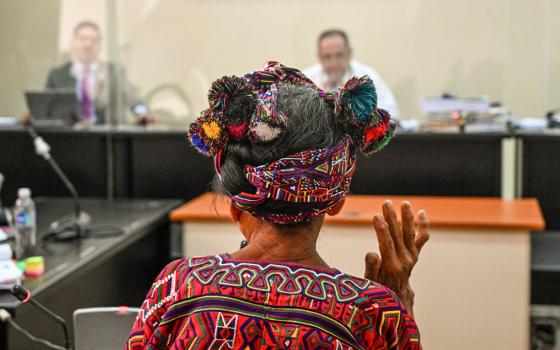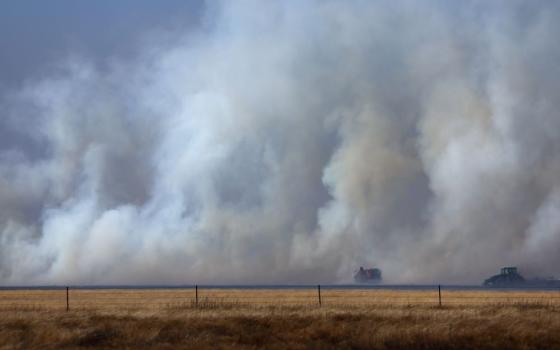By JOHN L. ALLEN JR.
Rome
It sounds suspiciously like a joke in search of a punch-line: “The pope, a rabbi and a Jesuit walk into a bar.” Change the word “bar” to “synod hall,” however, and it's no joke, but rather the agenda for Monday afternoon’s session of the Synod of Bishops on the Bible, in what promises to be among the early highlights of the three-week event.
The rabbi in question is Shear Yashuv Cohen, the chief Ashkenazi rabbi of Haifa, Israel, and a figure whose remarkable life story reflects the vicissitudes of modern Israel. The Jesuit is French Cardinal Albert Vanhoye, a Biblical scholar renowned for his work on the Letter to the Hebrews, and a former secretary of the Pontifical Biblical Commission.
The pope, obviously, is Benedict XVI.
On Monday afternoon, Cohen will make a presentation to the synod on the Jewish approach to the Bible, followed by remarks from Vanhoye on how Christians understand the Jewish scriptures. Among other things, Vanhoye is expected to draw upon a 2001 document from the Pontifical Biblical Commission titled “The Jewish People and their Sacred Scriptures in the Christian Bible.”
Cohen will become the first non-Christian to address a synod of bishops, marking merely the latest chapter of what has already been a ground-breaking career.
Born in Jerusalem in 1927 as the son of a famed rabbi, the young Cohen grew up in an intensely religious milieu. As a child he was a “nazirite,” meaning that he took vows never to cut his hair or beard, not to drink wine or eat grapes, and not to attend funerals. At age 16 he was released from those promises, but he remains a strict vegetarian.
The young Cohen also became active in the push for Israeli statehood. He joined a group linked to the Irgun, an armed group demanding a Jewish state. During the fighting that surrounded recognition of the nation of Israel in 1948, in which Jewish forces lost control of the Old City in Jerusalem, Cohen was wounded in the leg and spent time in a prisoner of war camp in Jordan.
“I still remember the day the British left the Old City,” Cohen recalled in a 2007 interview with the Jerusalem Post. “From our outposts, we heard Scottish bagpipes playing and the marching of many soldiers on the cobblestones gradually fading away. We realized we were on our own.”
Cohen has a high profile in Israel, having served both as the country’s Chief Rabbi and as Deputy Mayor of Jerusalem. He was serving in the latter capacity in 1967, when the Six-Day War broke out and Israeli troops recaptured the Old City.
“I had come full circle,” Cohen recalled. “I was the last Jew to leave the Old City of Jerusalem after it fell, and the first to return.”
Cohen heads the Ariel Institute, which trains local rabbis to act as communal leaders and also prepares rabbis to serve in Jewish communities abroad. He has served as Chief Rabbi of Haifa since 1975.
Cohen is also a veteran of Jewish-Catholic relations. Since 2002, the Vatican’s Commission for Religious Relations with Jews, led by Cardinal Walter Kasper, has organized a formal dialogue with the Chief Rabbinate of Israel. Cohen has led the Jewish delegation in those sessions.
Some Jewish analysts say the experience of being chief rabbi in Haifa gave Cohen a jump-start on the art of dialogue, since the city is often sharply divided between secular and religious Jews.
“I don't divide Jews into religious and secular,” Cohen said in 2007 of his own philosophy. “To me, they are all Jews.”
“I don’t believe in coercive religion,” Cohen said, “only in open communications.”
Cohen’s conversation partner tomorrow afternoon, Vanhoye, is arguably more qualified for the role than virtually anyone else among the 400 people who in some way are participating in this Synod of Bishops.
Born in Hazebrouck, France, the young Vanhoye entered the Society of Jesus in 1941. He earned a doctorate in scripture, focusing on the Letter to the Hebrews, from the Pontifical Biblical Institute in Rome, which is linked to the Jesuit-run Gregorian University. From 1963 to 1988 he served as a professor at the institute, and from 1984 to 1990 was its rector.
Vanhoye also served for a stretch as the secretary of the Pontifical Biblical Commission, an advisory body to the Congregation for the Doctrine of the Faith, where he came to know then-Cardinal Joseph Ratzinger.
In 2006, Ratzinger, by then Pope Benedict XVI, elevated Vanhoye to the College of Cardinals, even though the Jesuit was already over 80 and therefore ineligible to vote for the next pope.
Vanhoye requested, and Benedict granted, a waiver from the normal requirement to be ordained a bishop before becoming a cardinal.
Among Vanhoye’s books are three volumes on the Letter to the Hebrews, and one on priesthood in the New Testament.
One striking fact about tomorrow’s three-way encounter linking Benedict XVI, Cohen and Vanhoye is that each is more than 80 years old; Benedict and Cohen were both born in 1927, Vanhoye in 1923.
If age typically brings wisdom, in other words, tomorrow should be a wise day indeed.




